
The Many Faces of Health Care Leadership
Sunday, April 1, 2012
By Sue Wilson
Whether on the local, national or international level, Carlson School alumni hold prominent positions in the health care industry. Armed with broad management skills and critical-thinking abilities honed during their business educations, they are leading the way in an evolving, exciting environment. Here are the stories of the pioneers, philanthropists, policymakers, executives, and entrepreneurs who are shaping our future.
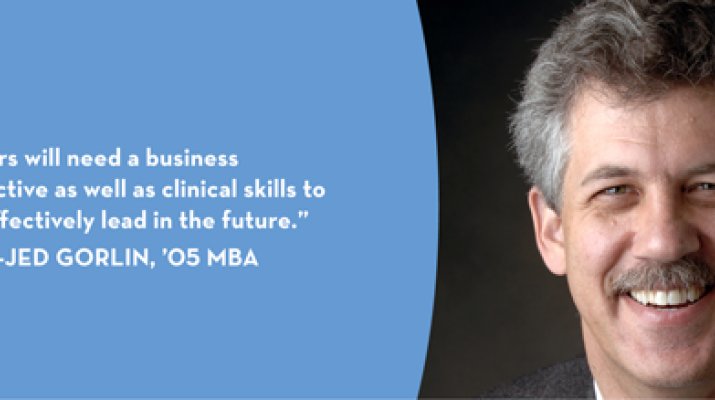
"Doctors will need a business perspective as well as clinical skills to most effectively lead in the future."
Medicine is His Business
Jed Gorlin, '05 MBA
Vice President of Medical and Quality Affairs, Medical Director, Memorial Blood Centers of Minnesota
Why would an MD want to add MBA to his credentials? Just ask Jed Gorlin, MD, vice president of medical and quality affairs, medical director, Memorial Blood Centers of Minnesota, who graduated from the Carlson School’s Executive MBA program in 2005.
Gorlin was in the midst of a successful, demanding medical career when he received a Bush Foundation Medical Fellowship to fund his business education at the Carlson School. “While I had plenty of medical training for my role at Memorial Blood Centers, I wanted to strengthen my administrative and leadership skills,” he says. “A blood center is essentially a manufacturing unit and I wanted to use industry tools to improve the effectiveness of our health care mission.”
Although Gorlin has held the same position with Memorial Blood Centers for nearly two decades, he has approached new opportunities and initiatives differently since attending business school. “I now routinely use business planning and strategy tools as well as concepts from operations and marketing models in my work,” he says. “For example, I recently prepared a report for our board that analyzed our supply and demand trends in terms of Porter’s Five Forces, business terms that many board members understand. Because we are selling services in an increasingly competitive market, it’s important for us to know our strengths and how we can leverage opportunities with our customers.”
While there were few representatives of the nonprofit community in his business classes, Gorlin says the MBA program provided a valuable opportunity to make connections at for-profit companies such as Seagate, Cargill, Target, and Best Buy. “Now, I better understand how we can work together, especially on programs like on-site company blood drives,” he says.
As a health care leader, Gorlin says he wants to help shape a future system that delivers quality care in an efficient, effective way. “Many physicians are concerned that ‘bean counters’ are making key decisions that dramatically impact hospitals, doctors, providers, and patients. Doctors will need a business perspective as well as clinical skills to most effectively lead in the future,” he says.
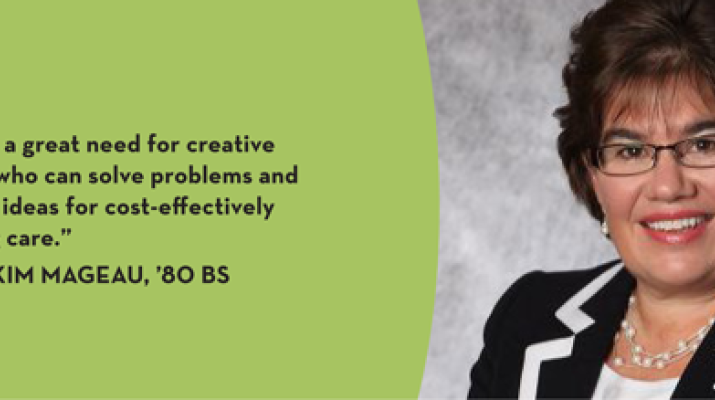
"There is a great need for creative thinkers who can solve problems and generate ideas for cost-effectively providing care."
Maximizing the Management of Pharmacy Benefits
Kim Mageau, '80 BS in Accounting
President of Magellan Pharmacy Solutions
Kim Mageau can’t look into a crystal ball to foretell the future of pharmacy benefits. But she can tell you that this is an opportune time to serve as an executive in the pharmaceutical industry. “Companies that manage health benefits are facing many challenges right now,” she says. “Coordination across the network of payers, providers, and patients needs improvement and the costs of specialty drugs are reducing the affordability of care. At the same time, there’s an incredible opportunity to shape legislative reforms and create cost-effective products and services while you are running your business.”
As the president of Magellan Pharmacy Solutions, Mageau is responsible for overall strategy and day-to-day operations of Magellan’s pharmacy management business which serves the commercial sector through specialty and medical pharmacy solutions and the public sector through its Medicaid pharmacy services.
Mageau strongly encourages business students to consider careers in health care. “Despite the recession, the industry continues to hire and grow robustly. There is a great need for creative thinkers who can solve problems and generate ideas for cost-effectively providing care,” she says.
Mageau adds that her undergraduate experience at the Carlson School was good preparation for executive roles. “I learned how to think on my feet, assess business issues from a broad perspective, and understand how the pieces of a situation fit together,” she says. Mageau also benefitted from the real-world experiences of her professors and from the Carlson School’s connections to the business and health care communities.
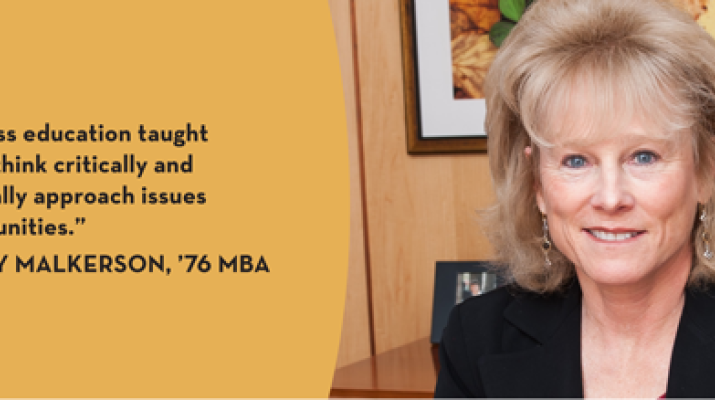
"My business education taught me how to think critically and systematically approach issues and opportunities."
Making Her Mark on Medical Philanthropy
Becky Malkerson, '76 MBA
President and CEO, Minnesota Medical Foundation
Raising a billion dollars in private gifts by 2017 may seem like an insurmountable task, but for Becky Malkerson, ’76 MBA, president and CEO of the University’s Minnesota Medical Foundation (MMF), and her team, it’s all in a day’s work. The billion-dollar milestone is MMF’s key strategic goal: To double the sustained philanthropy for the University of Minnesota’s Medical School, School of Public Health, and Masonic Cancer Center within five years.
Malkerson, who took the foundation’s helm in 2006, says that providing strategic leadership for MMF is similar to running a small company. She is accountable to the University’s president, MMF’s board of trustees, and the vice president of the Academic Health Center. The Medical Foundation’s scope includes operations, finance, development, asset management, and marketing and communications. By raising and managing private gifts, MMF facilitates the financial support of health and medical research, education, and care at the University of Minnesota, which has the potential to impact health around the world.
While earning an MBA degree from the Carlson School, Malkerson developed the critical problem-solving, decision-making, and teamwork skills she’s used throughout her career. “My business education taught me how to think critically and systematically approach issues and opportunities,” she says. “This knowledge base has enabled me to lead successful marketing, communications, and development initiatives for Fortune 500 companies, health care organizations, and non-profit boards.”
Malkerson’s leadership of MMF has led to landmark successes: An organizational restructuring, development of the organization’s first strategic plan, and obtaining the three largest financial gifts in the University of Minnesota’s history for cancer treatment, children’s health care, and diabetes research.
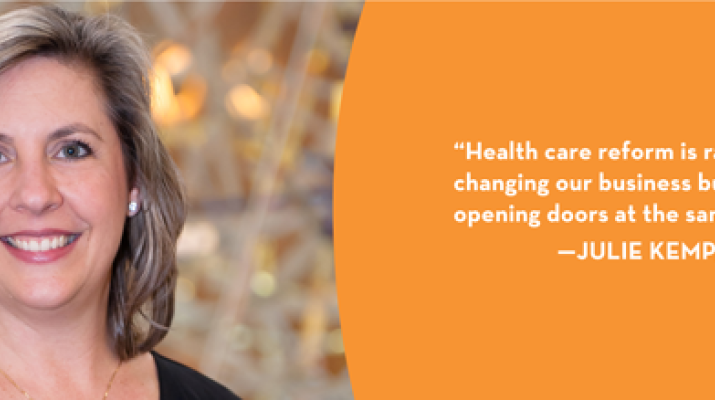
"Health care reform is rapidly changing our business but also opening doors at the same time."
Extending the Global Research of Medical Devices
Julie Kemp, '96 MBA
Director of Global Market Development/Marketing at Medtronic
Julie Kemp’s enthusiasm for marketing is catching. It’s been a key driver for her during the last 15 years as she’s worked her way up the marketing ladder at Medtronic and GE Healthcare in varied business roles and aspects of the profession. In her current position as director of global market development at Medtronic, she supports the global growth of medical device therapies such as cardiac resynchronization and boosts awareness of the Medtronic brand.
"Marketing roles with medical device manufacturers encompass clinical, technical, and business perspectives,” Kemp says. “We sell our device-based therapies to physicians, clinicians, and administrators by presenting the medical results of the procedures.”
When Kemp was an undergraduate majoring in biomedical engineering at the University, she heard Earl Bakken talk about Medtronic and knew she wanted to work for the company after graduation. After obtaining a clinical engineering position there, she began attending the Carlson School’s Executive MBA program to broaden her business background and leadership skills. She credits several “strong” professors with igniting her interest in marketing.
Kemp believes that business students have abundant opportunities in the health care industry. “Health care reform is rapidly changing our business but also opening doors at the same time,” she says. “Our customers now want to see evidence of the cost effectiveness of our device-based therapies alongside the clinical results. Tomorrow’s leaders will need to balance what is best for patients with what is best for society.”
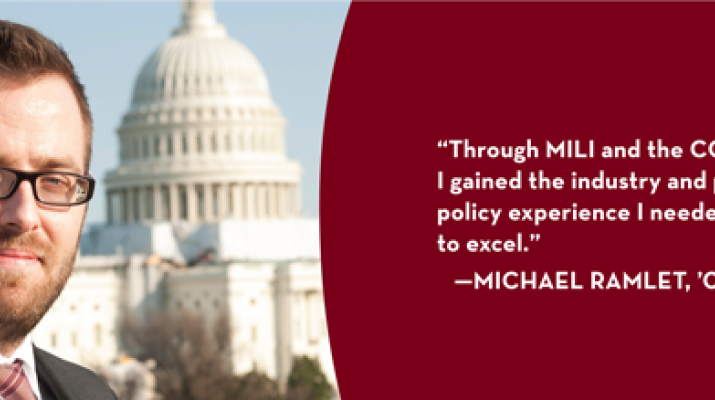
"Through MILI and the CCE, I gained the industry and public policy experience I needed to excel."
At the Center of the National Health Care Policy Debate
Michael Ramlet, '09 BSB
Director of Healthcare Policy, American Action Forum
Energetic does not begin to describe Michael Ramlet. While a student at the Carlson School, he completed the school’s first honors thesis and started an industry-leading report on health care policy. Now, nearly three years after graduation, his boundless energy has already placed him squarely in the middle of the health care policy debate in Washington, D.C.
As an undergraduate, Ramlet interned in the U.S. Senate and with UnitedHealth Group, developing an early interest in health care policy and business strategy. After completing the Carlson Consulting Enterprise (CCE) and Medical Industry Leadership Institute (MILI) programs, Ramlet completed his honors thesis under the faculty direction of MILI Director Stephen Parente. For the thesis, Ramlet evaluated the impact of federal funding on electronic medical record adoption and the potential for private sector incentives to accelerate implementation. His findings were published as a MILI working paper in 2010.
Shortly before graduating, Ramlet launched The Morning Consult (“The Consult”), a daily health care industry and public policy briefing. In three years, The Consult’s distribution list has grown to include over 1,500 industry executives, more than 250 Congressional health care advisors, and 31 State Secretaries of Health and Human Services across the country.
In addition to publishing The Consult, Ramlet is now the Director of Healthcare Policy at the American Action Forum, a Washington, D.C.—based think tank focused on providing Congress and governors with real-time policy analysis. In his role, Ramlet oversees a staff of seven policy analysts and has published more than 45 policy papers. He recently coordinated the submission of three Amicus briefs in the health care case brought before the U.S. Supreme Court.
“John Stavig, Phil Miller, and Stephen Parente have given my career a 10-year head start,” Ramlet says. “I draw on my Carlson experience every day, whether I’m working with executives, policymakers, or the press. Through MILI and the CCE, I gained the industry and public policy experience I needed to excel.”
Despite his busy schedule, Ramlet maintains his connection to the Carlson School. He is a MILI Affiliate and recently co-authored a MILI working paper that analyzes how the health care law will impact Medicare Advantage plan benefits and enrollment. Ramlet also actively recruits Carlson School students and graduates for paid summer internships and full-time positions in the nation’s capital.
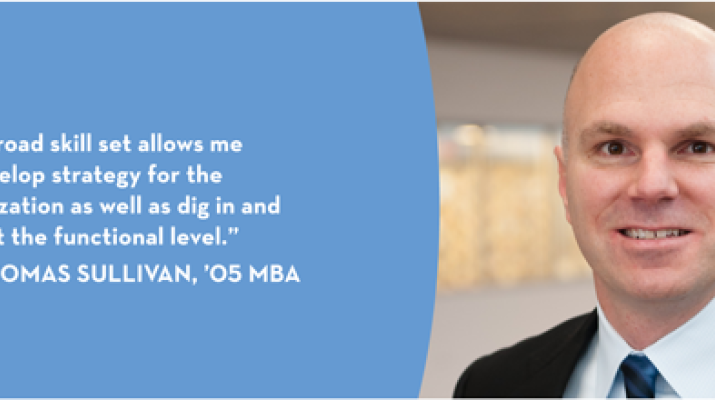
"My broad skill set allows me to develop strategy for the organization as well as dig in and help at the functional level."
From Executive to Entrepreneur, His Focus is Innovation
Thomas Sullivan, '05 MBA
President, Chief Financial Officer, and Co-founder, Fortel Analytics
Thomas Sullivan is good at taking risks. Whether helping start a new health care technology company, leading mergers and acquisitions, founding new corporate divisions, or simultaneously earning his MBA while leading an internal restructure, he has the foresight and general management skills to transform change into success.
Sullivan is one of seven founders at Fortel Analytics, a new company that provides information technology solutions for identifying, managing, and preventing fraud and abuse losses in medical claims for payers, providers, and beneficiaries. Its market is national in scope and both federal and state governments are customers. As president and CFO, he manages all financial aspects of the company and is deeply involved in the start-up’s strategy, sales, business development, and operations.
“When our CEO, Allan Klindworth, ’07 MBA, approached me with the concept for Fortel Analytics, I was intrigued by the business problem, the addressable market, and the type of solution he was proposing,” Sullivan says. “Although all start-ups are risky, I felt that I had been preparing for this type of opportunity for some time and made the decision to join the team.”
At Fortel Analytics, Sullivan is able to leverage his work experience in both financial services and health care. The company uses predictive modeling and other advanced analytics to detect health care fraud and abuse, similar to the predictive modeling systems used in financial services. “With limited funding and resources, everyone on the team has to be willing to roll up their sleeves and do whatever needs to get done,” he says. “My broad skill set allows me to develop strategy for the organization as well as dig in and help at the functional level.”
Sullivan credits the Carlson School’s Executive MBA program with helping him evolve from an accounting and finance professional into an executive with deep management and finance expertise. “Fundamentally, I took away various tools and approaches that have made me a better leader and a more strategic, decisive decision maker,” he says. More than anything else, the program gave me the confidence to take on new challenges and chase bigger dreams.”